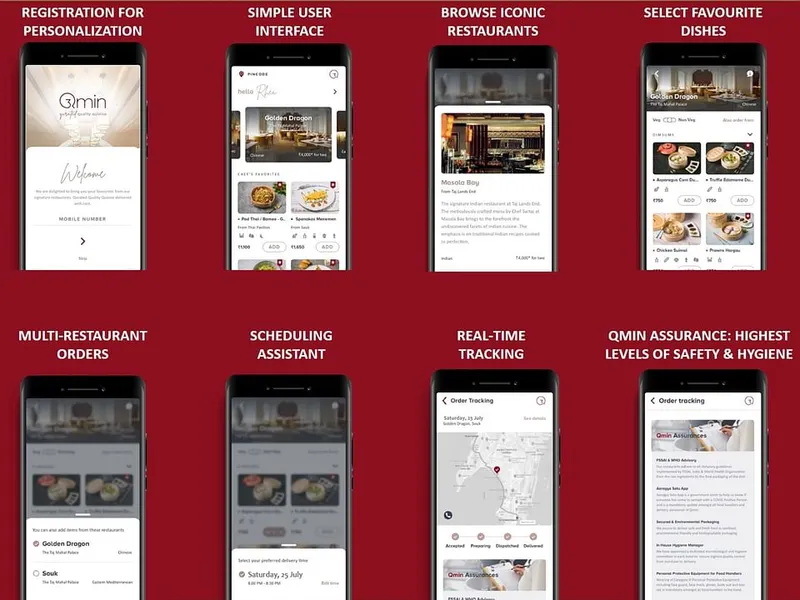Thinking like a startup, IHCL and its hotel brands reimagined business to mitigate COVID-19 impact
Puneet Chhatwal, MD and CEO, IHCL, explains how the hospitality brand followed a holistic strategy executed with agility to mitigate the effect of the lockdown. A prominent effort in this direction was Qmin, an app to bring IHCL’s culinary dishes to customers' homes.
The COVID-19 pandemic has pushed established companies and startups alike to reimagine their businesses. The hospitality industry (as well as the travel and tourism segment) was one of the worst affected, and its stakeholders had to come up with new ways to engage audiences.
One such venerable name was Indian Hotels Company Ltd (IHCL). The pandemic pushed IHCL to think like a startup and come up with creative ways to stay in touch with customers.
A subsidiary of the Tata Group conglomerate, IHCL followed a philosophy termed stragility- which is a portmanteau for a holistic strategy executed with agility - to implement a five-point plan to mitigate the impact of COVID-19.
In an exclusive interview with SMBStory, Puneet Chhatwal, MD and CEO, IHCL, says:
”We followed a plan called RESET 2020, which stands for achieving Revenue growth while upholding Excellence in operations, optimising Spends, Effectively managing our assets and imbibing a culture of Thrift and financial prudence.”
A prominent effort in this direction was Qmin, an initiative IHCL launched in July 2020 to bring its repertoire of culinary experiences and dishes from its restaurants to customers' homes in Mumbai, Delhi, Kolkata, Bengaluru, Chennai, and more.
The Qmin app
The Qmin app is accessible on the Google Play Store for Android users and the App Store for iOS users. Qmin and the app extend to cover a range of initiatives such as culinary masterclasses and custom meals.
“The app was designed and developed by IHCL in collaboration with Tata Digital within a short time-span of six weeks. It gives guests a differentiated delivery experience through a seamless interface that allows them to personalise their orders, curate menus, and track deliveries real-time,” Puneet says.
Describing the rationale behind such an initiative, he says, “The period of lockdown saw a significant increase in the time spent by people on their mobile devices, leading to a rise in the consumption of digital content. IHCL and its brands have been active on digital and social media channels to engage with our global audiences. And Qmin was one such initiative to keep them engaged and drive brand recall.”

Snapshots of the services available on the Qmin app
IHCL also shared exclusive chefs’ recipes, wellness and yoga tips from its experts at Jiva Spa, 4D - a travel experience to Dream, Drive, Discover, Delight, urban getaways, and more.
“With safety and hygiene being the biggest concern for travelers, these channels have assisted in driving awareness about our enhanced safety precautions across hotels in a relevant manner,” he adds.
A history of innovation
The launch of the Qmin mobile application is another addition to IHCL’s history of firsts. From being one of the first Indian hospitality brands and a pioneer of international cuisine in India to being the first large hospitality brand to launch an F&B centric delivery app in the country, IHCL is familiar with innovation.
Puneet, narrating the brand’s history, says, “We started with just one hotel i.e., the iconic Taj Mahal Palace, and expanded to being an iconic hospitality company in South Asia. This journey has not been devoid of challenges, such as pioneering destinations, securing iconic assets and relationships, or combating business impact from crises like 9/11, the collapse of the Lehman brothers, 26/11 and the current COVID-19 crisis.”
Like a startup, IHCL has taken these challenges in its stride and thought of crises as opportunities. To address difficulties whenever they arose, IHCL put its customers first and focussed on resilience and long-term sustainability.
And the awards and recognition have certainly kept spirits high. Some accolades include the Taj being ranked number one on Brand Finance’s list of the strongest Indian brands in its ‘India 100 2020’ report and the Taj Mahal Palace being rated number one in the world by TrustYou.

Puneet Chattwal, MD and CEO, IHCL
Travel and hospitality in the post-pandemic world
Puneet’s vision for the travel, tourism and hospitality industries in the post-pandemic world is optimistic. He believes it among the most resilient industries as traveling is a fundamental need.
“With agility, innovation and collaboration, we are emerging stronger, and we may well surpass pre-COVID numbers when travel recovers,” he says.
A recent survey by FICCI and Thrillophilia corroborates this. The survey revealed 50 percent of the respondents plan to travel in the next two months alone, and 33 percent are making plans to travel twice as much as they did in 2019.
To stay in touch with travellers and patrons, IHCL is continuing to focus on innovating, building and maintaining customer relationships through digital platforms such as Qmin. It is also signing more hotels, such as one in Tadoba Tiger Reserve and the second in Shiroda – a virgin beach destination in Sindhudurg district, in addition to a Vivanta in Lucknow, two Ginger hotels in Chennai and one in Patna.
“Strengthening our F&B offerings further, we opened a brewpub with AB InBev in Bengaluru in September. We are also expanding our homestays brand, amã Stays & Trails,” Puneet says.
In November, IHCL also launched a lifestyle gourmet store, Qmin Shop, in Mumbai. The shop offers a variety of artisanal products, handpicked delicacies and a coffee bar.
Edited by Megha Reddy









